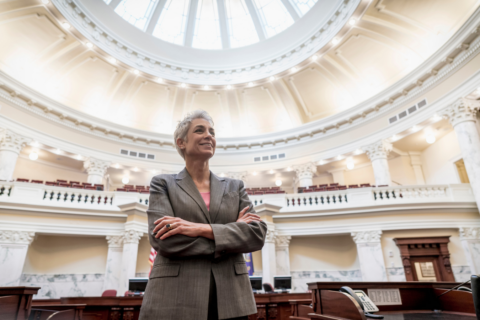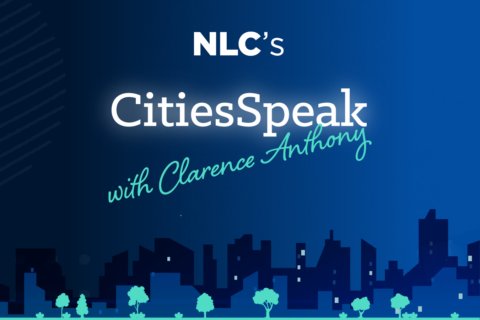Attention: How to Use the Most Critical Leadership Skill to Live Well
This vlog is part of NLC’s “Leading in the Moment” series, which focuses on the impact that mindfulness can have on leaders in local government and beyond. In this installment, NLC University’s Dana D’Orazio sat down with Dr. Amishi Jha, professor of psychology at the University of Miami and Founding Director of the Contemplative Neuroscience for the Mindfulness Research and Practice Initiative.
In this month’s interview, I spoke with Dr. Amishi Jha, professor of psychology at the University of Miami, Founding Director of Contemplative Neuroscience for the Mindfulness Research and Practice Initiative and author of Peak Mind. Attention is something we know is important but may not fully understand how to hone it, practice it and use it in a way to support us in our lives and our work. Join us as we explore attention and how to make it work with and for you.
The first bit of information Dr. Jha shared that might be refreshing to hear is that our brains are changeable (neuroplasticity) and with that we have a renewed sense of agency. While we may not be able to change our circumstances in some ways (such as living through a pandemic), we can train our brains to respond differently. Our brains are malleable tools (like muscles) and training one’s brain is going to continue to be a critical practice for everyone and essential for leaders in high stress, frontline positions – the government to military and beyond.
One of many brain functions is attention. Simply put, our attention is “the brain’s boss,” including being the way we process all kinds of information. Attention serves four main functions, as shared by Dr. Jha:
- Thinking: Pursuing an idea, the glue between moment to moment and thought, problem-solving, learning information
- Emotions: Feelings, including feeling the way we feel, regulating our emotions or responding appropriately and proportionately to a situation or event
- Connection: Extending your attention on another person, to connect with or understand someone else
- Empathy & Perspective-Taking: In addition to the above functions all required to lead, attention is also a key part of being able to empathize, relate and have perspective
As many of us have noticed when we experience burnout or “Zoom fog,” attention is also fragile. As Dr. Jha shares, in her research she’s found three things that are kryptonite for our attention:
- Stress
- Psychosocial threat, which includes a perceived threat to our reputation, our sense of justice or our sense of purpose
- Poor mood
All three can often be daily assaults on our attention. So with these three factors so common to our day-to-day lives, especially as leaders, what can we do? We can train for it. We can train our brain just like any other muscle. Dr. Jha shares that the military leaders call this their “mind push-up” — focus, notice, redirect, repeat.
Through her rigorous research and to her initial surprise (as you’ll hear in our interview), Dr. Jha found in study after study she led that mindfulness was the single most effective way to train your brain in support of attention. Despite rigorous scrutiny, the data showed mindfulness as a strategy for us all to change and train our brains for optimal attention in life and leadership.
As Dr. Jha shares in her new book, Peak Mind, knowing this would be another thing leaders were asked to make time for in their busy days, she dedicated time analyzing the optimal dose of time needed to train one’s brain to see results. Her studies found that 12-15 minutes daily is all the time needed to ensure your brain is fit and well-trained. If you want to learn more about the research-backed practices Dr. Jha trains leaders on you can get a sneak peek in our interview and also get a copy of her book where she outlines in easy-to-follow steps how to practice and train your brain.
Despite the uncertainty surrounding today’s leaders, there is one certain thing which is we have the agency to change our brains and own our attention in life and in our leadership. It may just be the one critical practice that makes the largest impact on ourselves and our communities.
Curious about Mindfulness in Local Government?
Learn more about NLC University.








